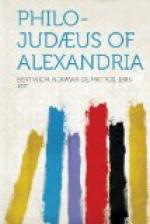Philo himself passed out of Jewish tradition within a short time, to become a Christian worthy. The destruction of the nation and the gradual severance of the Christian heresy from the main community compelled the abandonment of missionary activity and distrust of the work of its exponents. The dangerous aspect of the Alexandrian development was revealed. Its philosophical allegorizing might attract the Gentile to the Jewish Scriptures, but it also led the Jew away from his special conduct of life. The Alexandrian Church, which claimed to continue the tradition of Philo, departed further and further from the Jewish standpoint, and formulated a dogmatic creed that was utterly opposed to Jewish monotheism. A philosophical Judaism for the whole world was a splendid ideal, but unfortunately in Philo’s time it was incapable of accomplishment. The result of the attempt to found it was the establishment of a religion in which, together with the adoption of Hebraic teachings about God, certain ideas of Alexandrian mysticism became stereotyped as dogmas, and Jewish law was abrogated. When Babylon replaced Palestine as the centre of Jewish intellect, the works of Philo, like the rest of the Hellenistic-Jewish literature, written as they were in a strange tongue, fell into disuse, and before long were entirely forgotten. The Christians, on the other hand, found in Philo a notable evidence for many of their beliefs and a philosophical testimony for the dogmas of their creed. They claimed him as their own, and the Church Fathers, to bind him more closely to their tradition, invented fables of his meeting with Peter at Rome and Mark at Alexandria, They traced, in the treatise “On the Contemplative Life,” a record of early Christian monastic communities, and on account of this book especially regarded Philo almost with the reverence of an apostle. To the Christian theologians of Alexandria we owe it that the interpretation of Judaism to the Hellenic world in the light of Hellenic philosophy has been preserved. Of the two Jewish philosophers who have made a great contribution to the world’s intellectual development, Spinoza was excommunicated in his lifetime, and Philo suffered moral excommunication after his death. The writings of both exercised their chief influence outside the community; but the emancipated Jewry of our own day can in either case recognize the worth of the thinker, and point with pride to the saintliness of the man.




